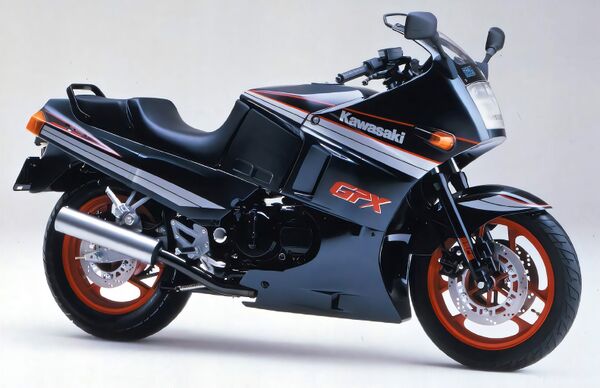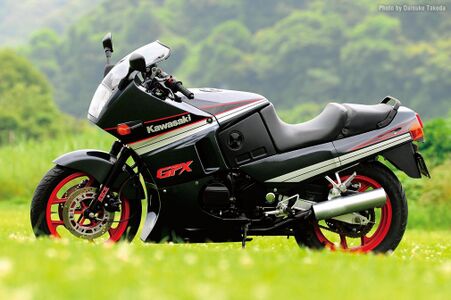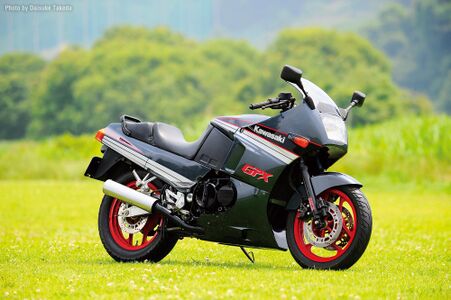Difference between revisions of "Kawasaki GPX400"
m (1 версия импортирована) |
m |
||
| (13 intermediate revisions by 2 users not shown) | |||
| Line 1: | Line 1: | ||
| − | {{DISPLAYTITLE: | + | {{DISPLAYTITLE: Kawasaki GPX 400 (R)}} |
| − | |||
{{#seo: | {{#seo: | ||
| − | |keywords= | + | |keywords={{PAGENAME}}, review, specs, owners manual, service manual, guide |
| − | | | + | |og:image=https://en.enduro.team/images/9/9a/Gpx400r_mod.jpg |
}} | }} | ||
| − | [[ | + | __notoc__ |
| − | + | [[file: Gpx400r mod.jpg | 600px | center | Kawasaki GPX400R]] | |
| + | The ''' Kawasaki GPX400R ''' sports bike model appeared in 1987 as the successor to the [[Kawasaki_GPZ400 | Kawasaki GPZ400R]]. However, despite this, both models were produced in parallel until 1990, until they were replaced by [[Kawasaki_ZZR400 | Kawasaki ZZ-R400]] and [[Kawasaki_ZXR400 | Kawasaki ZXR400]]. | ||
| + | {{Ads_top}} | ||
| + | Unlike the GPZ400, the new GPX400 model received a steel frame (instead of an aluminum one), which was called FAST and was close in performance to an aluminum one. Also the engine from [[Kawasaki_GPZ400 | GPZ400]] has been significantly redesigned and lightened and installed in the GPX400. By the way, in 1989 the model [[Kawasaki_GPZ400 | GPZ400]] gets this engine, as well as the chassis from the GPX400. The braking system has also undergone changes - instead of 1-piston calipers, the model receives more efficient 2-piston calipers. The AVDS anti-peel system is replaced by an electric ESCS (with a solenoid valve). Instead of conventional capacitor ignition (CDI), a digital transistor was installed. | ||
| − | + | 1989 was the last year of production for the Kawasaki GPX400R, after which it was discontinued. Thus, the model existed for about 3 years, which made it a rather rare model, even in Japan. On the Russian market, the Kawasaki GPX 400 is practically not found. | |
| − | + | == Photos == | |
| + | <gallery mode="packed" heights=200px> | ||
| + | File:1987 gpx400r 01-1009x671.jpg| | ||
| + | File:1987 gpx400r 02.jpg| | ||
| + | </gallery> | ||
| + | {{Ads_feed}} | ||
| + | {{Ads_post}} | ||
| − | + | == Specifications == | |
| − | + | Specifications Kawasaki GPX400R: | |
| − | + | {| class = "wikitable" | |
| − | + | ! scope = "row" | Model | |
| − | + | | Kawasaki GPX400R | |
| − | |||
| − | |||
| − | |||
| − | |||
| − | |||
| − | |||
| − | |||
| − | |||
| − | |||
| − | |||
| − | |||
| − | |||
| − | |||
| − | |||
| − | |||
| − | |||
| − | |||
| − | |||
| − | |||
| − | |||
| − | == | ||
| − | |||
| − | {| class="wikitable" | ||
| − | ! scope="row"| | ||
| − | |Kawasaki GPX400R | ||
|- | |- | ||
| − | ! scope="row"| | + | ! scope = "row" | Motorcycle type |
| − | | | + | | sports |
|- | |- | ||
| − | ! scope="row"| | + | ! scope = "row" | Release year |
| − | |1987-1989 | + | | 1987-1989 |
|- | |- | ||
| − | ! scope="row"| | + | ! scope = "row" | Frame |
| − | | | + | | steel (FAST) |
|- | |- | ||
| − | ! scope="row"| | + | ! scope = "row" | Engine type |
| − | |4- | + | | 4-cylinder, 4-stroke, in-line |
|- | |- | ||
| − | ! scope="row"| | + | ! scope = "row" | Working volume |
| − | |398 | + | | 398 cm³ |
|- | |- | ||
| − | ! scope="row"| | + | ! scope = "row" | Bore / Stroke |
| − | |56 | + | | 56.0 x 40.4 mm |
|- | |- | ||
| − | ! scope="row"| | + | ! scope = "row" | Compression ratio |
| − | |11.4:1 | + | | 11.4: 1 |
|- | |- | ||
| − | ! scope="row"| | + | ! scope = "row" | Cooling |
| − | | | + | | liquid |
|- | |- | ||
| − | ! scope="row"| | + | ! scope = "row" | Number of valves per cylinder |
| − | |DOHC, 4 | + | | DOHC, 4 valves per cylinder |
|- | |- | ||
| − | ! scope="row"| | + | ! scope = "row" | Fuel supply system |
| − | | | + | | Carburetor, 4x Keihin CVK30 |
|- | |- | ||
| − | ! scope="row"| | + | ! scope = "row" | Ignition type |
| − | | | + | | Digital transistor |
|- | |- | ||
| − | ! scope="row"| | + | ! scope = "row" | Maximum power |
| − | |59 | + | | 59.0 h.p. (43.4 kW) at 12000 rpm |
|- | |- | ||
| − | ! scope="row"| | + | ! scope = "row" | Maximum torque |
| − | |35 | + | | 35.0 Nm (3.6 kg * m) at 10,500 rpm |
|- | |- | ||
| − | ! scope="row"| | + | ! scope = "row" | Gearbox |
| − | |6- | + | | 6-speed |
|- | |- | ||
| − | ! scope="row"| | + | ! scope = "row" | Drive type |
| − | | | + | | chain |
|- | |- | ||
| − | ! scope="row"| | + | ! scope = "row" | Front tire size |
| − | |100/90-16 54H | + | | 100 / 90-16 54H |
|- | |- | ||
| − | ! scope="row"| | + | ! scope = "row" | Rear tire size |
| − | |130/90-16 67H | + | | 130 / 90-16 67H |
|- | |- | ||
| − | ! scope="row"| | + | ! scope = "row" | Front brakes |
| − | |2 | + | | 2 discs, 2-piston calipers |
|- | |- | ||
| − | ! scope="row"| | + | ! scope = "row" | Rear brakes |
| − | |1 | + | | 1 disc, 2-piston caliper |
|- | |- | ||
| − | ! scope="row"| | + | ! scope = "row" | Front suspension |
| − | | | + | | 38mm Air Fork with Anti-bite ESCS (Adjustable), 140mm Travel |
|- | |- | ||
| − | ! scope="row"| | + | ! scope = "row" | Rear suspension |
| − | | | + | | linkage Uni-Trak with pneumatic monoshock (adjustable preload and rebound damping), stroke - 130 mm |
|- | |- | ||
| − | ! scope="row"| | + | ! scope = "row" | Motorcycle length |
| − | |2105 | + | | 2105 mm |
|- | |- | ||
| − | ! scope="row"| | + | ! scope = "row" | Motorcycle width |
| − | |690 | + | | 690 mm |
|- | |- | ||
| − | ! scope="row"| | + | ! scope = "row" | Motorcycle height |
| − | |1155 | + | | 1155 mm |
|- | |- | ||
| − | ! scope="row"| | + | ! scope = "row" | Wheelbase |
| − | |1415 | + | | 1415 mm |
|- | |- | ||
| − | ! scope="row"| | + | ! scope = "row" | Saddle height |
| − | |755 | + | | 755 mm |
|- | |- | ||
| − | ! scope="row"| | + | ! scope = "row" | Minimum ground clearance |
| − | |115 | + | | 115 mm |
|- | |- | ||
| − | ! scope="row"| | + | ! scope = "row" | Acceleration to 100 km / h |
| − | |4 | + | | 4.5 sec |
|- | |- | ||
| − | ! scope="row"| | + | ! scope = "row" | Maximum speed |
| − | |205 | + | | 205 km / h |
|- | |- | ||
| − | ! scope="row"| | + | ! scope = "row" | Fuel tank capacity |
| − | |18 | + | | 18.0 l |
|- | |- | ||
| − | ! scope="row"| | + | ! scope = "row" | Motorcycle weight (dry) |
| − | |174 | + | | 174 kg |
|- | |- | ||
|} | |} | ||
| − | == | + | == Fuel consumption == |
| − | + | The minimum fuel consumption for the Kawasaki GPX 400 can reach 4-5 liters per 100 kilometers, the maximum is 10-12 liters. The exact value depends on the riding style and the condition of the motorcycle. | |
| − | |||
| − | |||
| − | |||
| − | |||
| − | |||
| − | |||
| − | |||
| − | == | + | == Documentation == |
| − | + | [[Category:Motorcycles]] | |
| − | - | + | * [https://drive.google.com/file/d/0B28GkOK3QDM-NFk3aEFDSl9vUGs/view Kawasaki GPX600R (Ninja 600R): service manual] |
| − | |||
| − | |||
| − | |||
| − | == | + | == == |
| − | + | {{Ads_recomended}} | |
Latest revision as of 13:30, 28 June 2023
The Kawasaki GPX400R sports bike model appeared in 1987 as the successor to the Kawasaki GPZ400R. However, despite this, both models were produced in parallel until 1990, until they were replaced by Kawasaki ZZ-R400 and Kawasaki ZXR400.
Unlike the GPZ400, the new GPX400 model received a steel frame (instead of an aluminum one), which was called FAST and was close in performance to an aluminum one. Also the engine from GPZ400 has been significantly redesigned and lightened and installed in the GPX400. By the way, in 1989 the model GPZ400 gets this engine, as well as the chassis from the GPX400. The braking system has also undergone changes - instead of 1-piston calipers, the model receives more efficient 2-piston calipers. The AVDS anti-peel system is replaced by an electric ESCS (with a solenoid valve). Instead of conventional capacitor ignition (CDI), a digital transistor was installed.
1989 was the last year of production for the Kawasaki GPX400R, after which it was discontinued. Thus, the model existed for about 3 years, which made it a rather rare model, even in Japan. On the Russian market, the Kawasaki GPX 400 is practically not found.
Photos
Specifications
Specifications Kawasaki GPX400R:
| Model | Kawasaki GPX400R |
|---|---|
| Motorcycle type | sports |
| Release year | 1987-1989 |
| Frame | steel (FAST) |
| Engine type | 4-cylinder, 4-stroke, in-line |
| Working volume | 398 cm³ |
| Bore / Stroke | 56.0 x 40.4 mm |
| Compression ratio | 11.4: 1 |
| Cooling | liquid |
| Number of valves per cylinder | DOHC, 4 valves per cylinder |
| Fuel supply system | Carburetor, 4x Keihin CVK30 |
| Ignition type | Digital transistor |
| Maximum power | 59.0 h.p. (43.4 kW) at 12000 rpm |
| Maximum torque | 35.0 Nm (3.6 kg * m) at 10,500 rpm |
| Gearbox | 6-speed |
| Drive type | chain |
| Front tire size | 100 / 90-16 54H |
| Rear tire size | 130 / 90-16 67H |
| Front brakes | 2 discs, 2-piston calipers |
| Rear brakes | 1 disc, 2-piston caliper |
| Front suspension | 38mm Air Fork with Anti-bite ESCS (Adjustable), 140mm Travel |
| Rear suspension | linkage Uni-Trak with pneumatic monoshock (adjustable preload and rebound damping), stroke - 130 mm |
| Motorcycle length | 2105 mm |
| Motorcycle width | 690 mm |
| Motorcycle height | 1155 mm |
| Wheelbase | 1415 mm |
| Saddle height | 755 mm |
| Minimum ground clearance | 115 mm |
| Acceleration to 100 km / h | 4.5 sec |
| Maximum speed | 205 km / h |
| Fuel tank capacity | 18.0 l |
| Motorcycle weight (dry) | 174 kg |
Fuel consumption
The minimum fuel consumption for the Kawasaki GPX 400 can reach 4-5 liters per 100 kilometers, the maximum is 10-12 liters. The exact value depends on the riding style and the condition of the motorcycle.
Documentation


